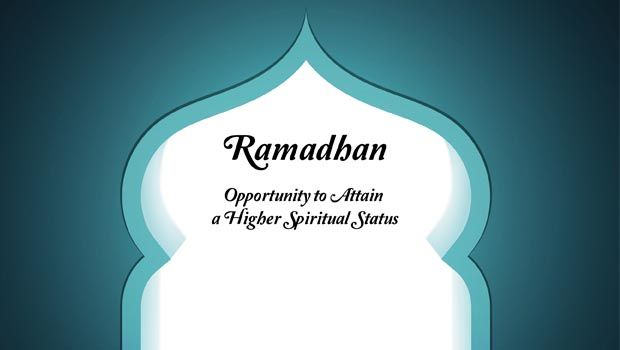All praises are for Allah, The Almighty, and may His peace and blessing be upon His true servant and final Messenger Muhammad, on his Companions and his household. The month of Ramadhan always comes to us with lots of blessings and opportunities from Allah SWT. Ramadhan is a very special month. It is the month of the Quran, siyaam (fasting), and qiyaam (the voluntary night prayer). In this month there is a great night, the Night of Qadr, that is better than one thousand months. This blessed month is an annual retreat of the soul to attain a higher spiritual status and to deepen and improve the relationship with the Divine — Allah SWT, with the creation (particularly with the servants of Allah SWT), and with the self (an-nafs).
The words ‘fasting is for Me’ (Allah SWT) are sufficient to indicate the superiority of fasting over all other acts of worship
Each of these has rights over us and Ramadhan is the time when we reset and reprogram ourselves to rectify and enhance these relationships. We hope that after we finish our fasting, we get closer to good and discard anything that might have stifled those relationships over the past year. No wonder we learn that the Sahaabah (RA) used to look forward to the month of Ramadhan six months before its arrival, and when it was done, they would reflect for the next five months upon their efforts and experience during the just-completed Ramadhan. Each Ramadhan, they would maximize every moment to fulfill the above-stated goals.
Relationship with Allah SWT
Let us begin with our relationship with Allah SWT. One of the greatest benefits of fasting the month of Ramadhan is to purify our intention and increase our sincerity in our relationship with Him. We are not fasting except to please Allah SWT. This particular act of worship distinguishes itself from the other acts of worship or Ibaadaat. For this we read the hadith of Abu Huraira (RA) who reported Allah’s Messenger (pbuh) as saying: “Every deed of the son of Adam would be multiplied, a good deed receiving a tenfold to seven hundredfold reward. Allah, the Exalted and Majestic, has said, ‘With the exception of fasting, for it is done for Me and I will give a reward for it, for one abandons his passion and food for My sake. There are two occasions of joy for one who fasts — joy when he breaks it, and joy when he meets his Lord, and the breath [of the one who fasts] is sweeter to Allah than the fragrance of musk” (Sahih al-Bukhari and Muslim).
We ought to refrain from backbiting, slander, lies, gossip, and any other word or deed that could harm another person
Al-Haafiz ibn Hajar (RA) quoted several views from scholars who sought to explain the meaning of this hadith as to why fasting was singled out in this manner. Firstly, there is no showing off in fasting as may happen in other acts of worship. Imam Al-Qurtubi said: “Because showing off may enter into all good deeds, but no one can see when a person is fasting except Allah, so Allah connected it to Himself. Hence He said in the hadith ‘He gives up his desire for My sake.’” Ibn al-Jawzi further explained it in a similar way: “All acts of worship can be seen when done, and they may be contaminated with some element of showing off, unlike fasting where there is no action to be seen or heard.”
Regarding what is meant by the words “I shall reward for it” is that only Allah SWT knows the extent of the reward and how much his good deeds (hasanaat) will be multiplied. Al-Qurtubi said: “What this means is that the amount of reward for good deeds may become known to people, and they will be rewarded between ten and seven hundredfold, and as much as Allah wants, except fasting, for Allah will reward it without measure.” This is supported by a report narrated by Muslim from Abu Hurairah (RA). The Messenger of Allah (pbuh) said: “Every deed of the son of Adam will be rewarded between ten and seven hundredfold. Allah said, ‘Except fasting, for it is for Me and I shall reward for it.’” Again, this means that He shall reward it greatly, without specifying how much.
Regarding what is meant by “fasting is for Me” is that it is the dearest of acts of worship to Allah SWT. Ibn Abd al-Barr (RA) said: “The words ‘fasting is for Me’ are sufficient to indicate the superiority of fasting over all other acts of worship.” This is supported by a hadith narrated by Abu Umaamah (RA). The Messenger of Allah (pbuh) said: “You should fast, for there is nothing like it” (An-Nasaa’i). Yet another thought about the statement “fasting is for Me” is that fasting is mentioned in conjunction with Allah by way of honoring. This is similar to when one says Baitullah or “the House of Allah,” giving honor to the Kabah as opposed to the other houses or places of worship.
There is no doubt that fasting done for Allah’s (SWT) sake cleanses one from shirk, doubts, showing-off, insincere intentions, arrogance, and all those negative qualities that cause a person to be distanced from Allah SWT. Another way of strengthening our relationship with Allah SWT is to humble ourselves in what Allah has commanded us to do so. Allah alone is the one who issues rulings, and His rulings are the most wise and perfect. Thus, the Believers hasten to obey the commands of Allah and His Messenger (pbuh). He SWT says in the Quran: “It is not for a believing man or a believing woman, when Allah and His Messenger have decided a matter, that they should have any choice about their affair. And whoever disobeys Allah and His Messenger has certainly strayed into clear error” (Quran 33:36).
These days too many people believe that they can pick and choose their acts of worship. A person may choose to give a thousand dollars in charity but not fast a single day. Or vice versa, or he may fast all month but not want to give anything from his wealth. So fasting the month of Ramadhan is done for His sake and has its immense rewards. But it also is meant to strengthen the relationship with Allah SWT so that one complies with His commands without hesitation, with devotion and sincerity.
Relationship with Our Fellow Human Beings
Next in line is the relationship that ought to be strengthened with our fellow human beings during the month of Ramadhan. We are given the glad tidings from Rasoolullah (pbuh) who said: “In Paradise there are rooms whose insides can be seen from the outside, and the outside can be seen from the inside. A Bedouin asked, ‘Who are they for, O Messenger of Allah?’ He said, ‘For those who speak kindly, feed the hungry, and stand in prayer at night whilst the people are sleeping.’” While this can be done throughout the year, during the month of Ramadhan it is easier to increase these good deeds. It is the best time to provide food to those who are poor and hungry.
Fasting makes us feel compassion and empathy towards the poor, because when the fasting person tastes the pain of hunger for a while, he remembers those who are in this situation all the time, so he will hasten to do acts of kindness and show compassion towards them. So fasting is a means of feeling empathy with the poor and intensifying the urge to give. During Ramadhan, Rasoolullah (pbuh) exercised this quality of giving more than other times. In a hadith we learn that Rasoolullah “was the most generous of all the people and he used to become more generous in Ramadhan when Jibril met him. Jibril used to meet him every night during Ramadan to review the Quran with him. Allah’s Apostle then used to be more generous than the fast wind.” He even encourages us to offer a fasting person something with which to break his/her fast. He tells us: “Whoever gives food to a fasting person with which to break his fast will have a reward like his without detracting from the reward of the fasting person in the slightest” (At-Tirmidhi).
Above all, Ramadhan teaches us to withhold our tongues and hands from harming others. This perhaps is the one of the most powerful ways of strengthening our relationship with our fellow human beings. He (pbuh) warns: “Whosoever does not leave bad words and bad actions, Allah does not care if he leaves his food and drink” (Al-Tirmidhi). Thus, we ought to refrain from backbiting, slander, lies, gossip, and any other word or deed that could harm another person. So if we fast right, we can discard hypocritical relationships with our fellow brothers and sisters, and instead develop a lasting bond of fellowship based on mutual caring, respect, and sincerity. If a person does that for a whole month sincerely, the rest of the year will go well. If on the other hand, we harm each other while fasting, then there is no difference between a day when we fast and a day when we do not. We may end up fasting year after year yet we are back to square one. Nothing has stayed with us and this is sad.
Rasoolullah (pbuh) advises us that the month of Ramadhan is time to be sincere and make du’a for our brothers and sisters. In a hadith, Safwan narrates: “I visited Abu Darda’s house in Sham. I did not find him there but Umm Darda [was present at the house]. She said, ‘Do you intend to perform Hajj during this year?’ I said, ‘Yes.’ She said, ‘Do supplicate Allah for blessings upon us, for Allah’s Apostle [peace be upon him] used to say: The supplication of a Muslim for his brother in his absence is responded to so long as he makes a supplication for blessings for his brother and the commissioned Angel says: Ameen, and says, may it be for you too! I went to the market and met Abu Darda and he narrated the same from Allah’s Apostle [peace be upon him]” (Muslim).
Relationship with Our Own Nafs (Self)
The nafs is the seat of Shaitan within us and Allah SWT has given us this noble opportunity in the month of Ramadhan to conquer the Shaitan that resides within. Rasoolullah (pbuh) informs us: “When Ramadan comes, the gates of Paradise are opened, the gates of Hellfire are closed, and the devils are chained up. For this He SWT has chained the devils so that we can utilize his weakness to gain our strength.” While there are many interpretations for this hadith, it would appear that the Shaiateen are not able to tempt the Muslims as they are able to do to others because they are busy with the fast which controls their desires, and by reading the Quran and doing zhikr of Allah SWT.
Another dimension to this is that fasting humiliates and weakens the Shaitan. It weakens the effects of his whispers (waswaas) on a person, and thus the person’s sins are reduced. That is because the Shaitan “flows through the son of Adam like blood” as the Prophet (pbuh) said, but fasting narrows the passages through which the Shaitan flows, so his influence grows less.
The greatest inner quality that is developed deep within us during the month of Ramadhan is taqwa. In fact, it is the primary reason for fasting in the month of Ramadhan. Allah SWT says: “O you who believe! Observing the fast is prescribed for you as it was prescribed for those before you, that you may become al-muttaqoon [those who are pious, those with taqwa]” (Quran 2:183). The aim mentioned here is taqwa (God- consciousness, piety, and fear of God) and taqwa means giving up haraam things, and in general terms includes both doing what is commanded and abstaining from what is forbidden for Allah’s (SWT) pleasure. So if by fasting we can give up halaal things (temporarily) in order to please Allah and for fear of His painful torment, then we will be more likely to refrain from haraam things for the same purpose. Once again, if a person does that for a whole month, the rest of the year will go well in his or her efforts to achieve this inner deep God-consciousness.
Finally, every heart desires something great. Each individual wants to achieve great things in life. Through fasting, we aim high, with the goal of attaining the forgiveness of our sins and reaching the special place in Jannah called ar-Rayyaan! Sahl ibn Sa’d reported that the Prophet said: “There is a gate to Paradise that is called ar-Rayyan. On the Day of Resurrection it will say, ‘Where are those who fasted?’ When the last [one] has passed through the gate, it will be locked” (Al Bukhari and Muslim).
Concluding Thoughts
Dear brothers and sisters, let us not allow the month of Ramadhan to come and go without achieving the greatness and grandeur it can bring us. I’ll remind myself and all of us of a hadith of Rasoolullah (pbuh): “The Messenger (pbuh) climbed the minbar and said, ‘Ameen, Ameen, Ameen!’ The Companions inquired concerning this, and he responded, ‘Verily Jibril approached me and said: Whomsoever reaches the month of Ramadhan but does not have his sins forgiven before his death, and due to this he enters the Hell-fire, may Allah distance this person. Jibril then ordered me to say Ameen, so I said Ameen.’” (Ibn Hiban)
If we do not do good in this blessed month of Ramadhan, then when else? Qatadah (one of the early scholars) said, “It used to be said: Whoever does not have his sins forgiven in Ramadhan, he will not have his sins forgiven in other than Ramadhan.” May Allah (SWT) accept all of our Ibadaat, ameen.





